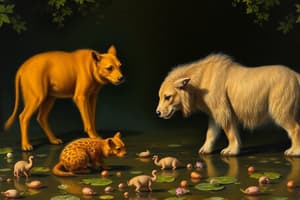Podcast
Questions and Answers
What is a herbivore?
What is a herbivore?
- An organism that does not eat
- An animal that eats both plants and animals
- An animal that eats only plants (correct)
- An animal that feeds on other animals
What defines a carnivore?
What defines a carnivore?
- An organism that eats only plants
- An animal that feeds on other animals (correct)
- An organism that is not a consumer
- An organism that eats both plants and animals
What is an omnivore?
What is an omnivore?
- An animal that eats only plants
- An organism that feeds on other organisms
- An organism that produces its own food
- An organism that eats both plants and animals (correct)
What is a food chain?
What is a food chain?
Define a food web.
Define a food web.
What is prey?
What is prey?
Define a predator.
Define a predator.
What is symbiosis?
What is symbiosis?
What is mutualism?
What is mutualism?
Define commensalism.
Define commensalism.
What is parasitism?
What is parasitism?
What is coevolution?
What is coevolution?
Define a producer.
Define a producer.
What is a consumer?
What is a consumer?
Flashcards
What is a herbivore?
What is a herbivore?
An animal that eats only plants.
What defines a carnivore?
What defines a carnivore?
An animal that feeds on other animals.
What is an omnivore?
What is an omnivore?
An organism that eats both plants and animals.
What is a food chain?
What is a food chain?
Signup and view all the flashcards
Define a food web.
Define a food web.
Signup and view all the flashcards
What is prey?
What is prey?
Signup and view all the flashcards
Define a predator.
Define a predator.
Signup and view all the flashcards
What is symbiosis?
What is symbiosis?
Signup and view all the flashcards
What is mutualism?
What is mutualism?
Signup and view all the flashcards
Define commensalism.
Define commensalism.
Signup and view all the flashcards
What is parasitism?
What is parasitism?
Signup and view all the flashcards
What is coevolution?
What is coevolution?
Signup and view all the flashcards
Define a producer.
Define a producer.
Signup and view all the flashcards
What is a consumer?
What is a consumer?
Signup and view all the flashcards
Study Notes
Types of Organisms
- Herbivore: Exclusively consumes plants.
- Carnivore: Primarily feeds on other animals; may include some plants.
- Omnivore: Consumes both plants and animals, exhibiting dietary flexibility.
Ecological Concepts
- Food Chain: Sequential series illustrating how energy is transferred through consumption, starting from producers to various levels of consumers.
- Food Web: A complex network depicting several interlinked food chains within a community, showcasing the diverse feeding relationships among organisms.
Predator-Prey Dynamics
- Prey: An organism that is hunted and consumed by another organism.
- Predator: An organism that actively hunts and feeds on other organisms for sustenance.
Symbiotic Relationships
- Symbiosis: Refers to the close interrelationship between two different species that provides benefits to at least one party.
- Mutualism: A type of symbiotic relationship where both species involved gain benefits.
- Commensalism: A relationship where one organism benefits while the other is neither helped nor harmed.
- Parasitism: A harmful relationship where one organism lives on or in a host, causing detriment to the host organism.
Evolution and Interaction
- Coevolution: The process wherein two interacting species reciprocally influence each other’s evolution, often leading to specialized adaptations.
Nutritional Roles
- Producer: A self-sustaining organism that generates its own food through processes like photosynthesis.
- Consumer: Individuals or households that buy goods or services, broadly relating to the idea of consumption in ecological terms.
Studying That Suits You
Use AI to generate personalized quizzes and flashcards to suit your learning preferences.




